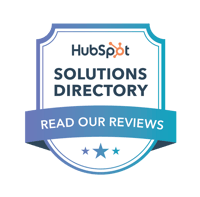Hot take: what's under the hood of your website is more important than how it looks.
Don't get me wrong - what your website looks like is important, too. But having a great-looking website that's buggy, that you can't edit and that you can't get leads from is ultimately pointless.
That's why choosing the right CMS (content management system) to run your website is critical. And if you've been exploring options, then you probably have seen HubSpot come up as an option. But is it a good fit for your business needs?
Let's take a peek under the hood to see what HubSpot CMS - now known as Content Hub - offers and who it will work best for.
What is a CMS?
Before I dive into the use cases below, here's a quick check-in to make sure we're on the same page.
As a refresher, CMS stands for content management system, or the platform/tool used to create and edit your site. A CMS is the actual tool on which your website is built. In most cases, you'll log into your website and access a user interface that allows you to make changes, like adding a page, updating the design of the site, uploading content, etc. This is separate from your hosting, which is what makes your website accessible on the internet to any user.
The most common CMS platforms are WordPress, Joomla, HubSpot, Shopify, Drupal, Magento, Wix and Squarespace. There's a good chance your current website is using one of those. If not, then you might be using an industry-specific CMS.
No matter what you use, you may have frustrations with your CMS and/or you have no idea how to edit your site and have to go through a developer. This is most common with open-source CMS platforms like WordPress and Magento.

What is HubSpot Content Hub?
Content Hub is a popular content management system with B2B companies. I'll explore some of the reasons why below. First, it's worth knowing HubSpot's general structure because it differs from other CMS options. Unlike standard CMS options like WordPress or Shopify, HubSpot Content Hub is a standalone or group option within HubSpot, a large-scale suite of cloud-based software tools.
HubSpot's core offering is a CRM (customer relationship management system). From there, there are 7 Hubs that each offer different core functionalities:
- Content Hub for website development
- Sales Hub for lead management and sales enablement
- Marketing Hub for all inbound and outbound marketing tools
- Service Hub for retention of existing customers
- Commerce Hub for collecting payments and/or selling products
- Operations Hub for advanced integration and clean-up of all Hubs
You can purchase only the Content Hub or add-on Content Hub with other HubSpot Hubs. Either way, you get the free CRM with any HubSpot tool.
Below, I'll assume that you're looking at Content Hub as a solo solution, with the potential to add other Hubs in the future.
Related Content: An In-Depth Guide to HubSpot Content Hub
Consider Choosing HubSpot If...
1. You need to make content updates more than once a year
"Content updates" here can range from fixing a typo on a page to rewriting an entire section and adding pictures. With many CMS tools, updating content can be difficult, confusing or time-intensive. Depending on your current tool, you may have to submit a request to your IT department or external web developer whenever you want a change. When you have to do this more than once a year, it gets annoying and pricey.
Content Hub uses an intuitive editing interface
Content Hub is designed with marketers in mind, which also means that it's designed for non-developers. You don't need to worry about coding to make changes - anyone on the team can easily learn how to make copy/text and imagery changes, without breaking anything. If you can use a content editor like Microsoft Word or Google Docs, you'll be able to edit your web pages and blogs.
Built-in organization tools make it easy to keep data and content tidy
The integrated structure of HubSpot's website builder makes it easy to keep things organized without needing to install widgets. By default, web pages, landing pages and blogs are separate areas within the tool. On your site, they display side-by-side. But for editing, it's always easy to find exactly what you're looking for without combing through a large list of pages. Additionally, the built-in content library is great for keeping items stored in folders, for easy access.
Multi-blog functionality can be used for more than just traditional blogs
With Content Hub, you can also have multiple "blogs" on your website, so you can further organize and tap into tools. I put "blogs" in quotes because you don't have to use them like a blog, you can use these for any sort of functionality where you need one archival navigation page and separate posts. For example, we'll often set up three "blogs" for clients:
- A primary blog to host articles
- A directory of upcoming events
- A portfolio of case studies
This is just the tip of the iceberg. If you don't want to resort to installing additional plug-ins for simple functionality, Content Hub is a great option.
2. You need more than "just a website"
As your business grows, your website needs to do more. If you need a 3 page website just to let people know that you exist when they search for you on Google, then a tool like WordPress or Squarespace will suffice. But if you're ready to take your website to the next level - whether it's as a lead generation tool or with advanced functionality (or both!) HubSpot is the better choice.
CRM and CMS interconnectivity
Even if you don't use HubSpot's other Hubs, Content Hub includes access to the free CRM. This connectivity unlocks a huge range of possibilities. You can:
- Track a specific user's journey: what pages do they visit? Where do they engage with your site? When?
- Use smart content to tailor messaging based on user interest.
- Store user data to improve their experience - no need to re-type the same information multiple times.
- Fetch data from one place without needing to set up and connect different tools.
This is just a starting point, but consider what else you could do today if your customer data and website data were connected.
Built-in lead generation and nurturing tools
If you want your site to be a supercharged lead generation tool, then Content Hub is a great choice. Content Hub is designed with lead generation and conversions in mind, so it's a better choice for organizations looking to grow. Built-in tools include:
- HubSpot AI - Use AI-powered tools for content generation, report creation and more.
- Content Remix - Generate and repurpose additional content out of a single blog post.
- Brand Voice - AI will track your unique brand voice. When you use AI-generating tools, it will automatically apply your brand voice to content.
- Video & Podcast Hosting - Host and embed video and podcast content without dragging down your site's loading speed.
- SEO Recommendations - Get real-time optimization suggestions and insights for your blog post and website pages.
- Memberships - Create content for specific Member contacts, that's hidden to others.
- AI Translation - AI-powered language translation for pages and blogs.
- Custom Reporting - Build custom reports right within HubSpot to track website, lead and customer activity.
These all help generate leads through content, while also making it easy to follow up with leads after they engage.
Integrations galore
Content Hub comes with a lot of functionality, but it's also easy to tap into additional options and integrate with the tools you already use - like Google, Outlook, Salesforce and more.
Unlike WordPress plug-ins, these integrations are managed directly by HubSpot and vetted for both security and functionality. You can safely install integrations without needing to verify their authenticity, and you also don't have to monitor them for updates. HubSpot does that for you, and lets you know when it's time to update.
No-fuss hosting
One of the biggest benefits of Content Hub is that it includes hosting. This lets you manage every aspect of your website in one place and alleviates the headache that often comes with third-party hosts.
HubSpot's hosting agreement includes the top security measures you need, alongside uptime monitoring and 24/7/365 support. If there's an issue, you don't have to chase down an external host - contact support right from the same place you go to update your website.

3. You Already Use Other HubSpot Hubs (or are planning to)
This might seem obvious, but it's worth calling out. If you're already using other HubSpot tools, you should consider Content Hub. HubSpot's Hubs are designed to work together, so the more Hubs you use the more cool tools you unlock.
Marketing Hub
Pairing Content with Marketing is a match made in digital heaven, especially since your website is such a vital part of your marketing strategy. Seamlessly transition leads from your website into your other marketing efforts via workflows to send them custom email messages, tailored landing pages and more. This can also be a financial benefit as well - as HubSpot has a Marketing+ bundle that includes both Marketing Hub and Content Hub together for less than the price of purchasing separately. Check out HubSpot's pricing page for the Marketing+ bundle to see all the tools that come with this option (it's a lot!) and contact us if you have any questions or are interested in this option.
Sales Hub
Knowing a potential customer's full journey is a huge advantage for any sales team, and having the activities and behaviors of your contacts shown right in HubSpot is the way to gain that advantage. See how they engage with your site, and where.
Service Hub
Your website isn’t just there to attract new customers; it's also there to support and maintain your existing customers. Use tools like a custom knowledge base and chat to help customers self-service routine needs, and log service tickets when they need more help.
Commerce Hub
With HubSpot’s free Commerce Hub, you can take payments right from your site. You’ll also be able to send quotes, proposals and invoices to contacts once they’ve come in on your website to convert them into customers.
Operations Hub
Clean up data as it enters your website to create more accurate and dynamic content experiences. Additionally, Operations Hub + Content Hub will give you access to even more reporting.
Final Thoughts
Making the switch to a new CMS is never easy. I’ve highlighted some of the best use cases for HubSpot above—if any of those use cases ring true, you should consider Content Hub.
And if you’re considering HubSpot CMS, you’ll still be doing some research. Check out our Content Hub Buyer’s Guide to get into more of the nitty-gritty deets you need. This comparison guide includes:
- A breakdown of pricing and tier options
- What’s included
- Considerations to make before purchase
- Exclusive features and how to use them
I’ve hopefully given you more information as you make your CMS comparisons, and the Buyer’s Guide will give you that next level of information. You can also of course just contact me directly if you’re interested in learning more about HubSpot CMS or other HubSpot service offerings.
BizzyWeb is a Minneapolis-based digital marketing and web design agency that helps companies get the high-quality leads they need to grow and thrive. Our tactics include inbound marketing, SEO, advertising, web design, content creation and sales automation. We are an accredited HubSpot Diamond Partner and we offer full-service HubSpot onboarding, enablement and strategy for new and current users.
Note: This blog was originally published March 2024 and updated August 2024 for accuracy and current offerings.






